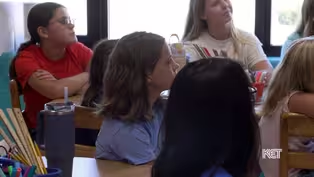
The Buzz on Mosquito-Borne Viruses
Clip: Season 3 Episode 64 | 3m 36sVideo has Closed Captions
Kentucky's risk for mosquito-borne viruses.
A University of Kentucky entomologist explains why the risk of getting mosquito-borne viruses could be greater this year.
Problems playing video? | Closed Captioning Feedback
Problems playing video? | Closed Captioning Feedback
Kentucky Edition is a local public television program presented by KET

The Buzz on Mosquito-Borne Viruses
Clip: Season 3 Episode 64 | 3m 36sVideo has Closed Captions
A University of Kentucky entomologist explains why the risk of getting mosquito-borne viruses could be greater this year.
Problems playing video? | Closed Captioning Feedback
How to Watch Kentucky Edition
Kentucky Edition is available to stream on pbs.org and the free PBS App, available on iPhone, Apple TV, Android TV, Android smartphones, Amazon Fire TV, Amazon Fire Tablet, Roku, Samsung Smart TV, and Vizio.
Providing Support for PBS.org
Learn Moreabout PBS online sponsorshipA mosquito virus that's rarely found in the US is making headlines.
It's called E for Short and it recently led to one person dying in the Northeast.
While there haven't been any cases of it in Kentucky, we aren't immune from other mosquito spread viruses.
And this heat is not helping in today's health news.
An entomologist explains why mosquito season maybe lasting longer.
Eastern Equine Encephalitis is also known as unique.
This is a virus.
It's primarily found in birds, and then it's vectored by a very specific mosquito amongst birds.
It's called the black tailed mosquito.
There are occasions, though, where the birds that are fed on may also be bitten by other species of mosquito.
And those other species of mosquito may occasionally bite things like humans or horses.
And so when that happens, there is the potential to build this bridge from the birds to us or to these expensive horses and vector the pathogen there.
But then we are called a dead end host, because once it's inside of us, it doesn't reach the levels that it needs to in order to be picked up by another species of mosquito and move from me to you or from me to a horse or vice versa.
This is relatively speaking, a rare mosquito borne illness in the United States, particularly when you would compare it to something like West Nile virus or what have you.
So what's the virus?
It's one of the more common mosquito borne illnesses that we still have here in the United States.
It's not as common necessarily in Kentucky compared to some other states.
States with more migratory birds, they're the ones that end up seemingly with more cases of it.
But the people who get it are sometimes symptomatic where they develop a fever and other symptoms.
Sometimes people will develop a serious reaction to it, sometimes fatal.
And so it starts in the summer.
It continues through fall.
Again, it's a it's an insect borne pathogen.
So it's picked up by mosquitoes, usually from a bird, and then it's factored into a human.
When we think about climate and mosquitoes, mosquitoes are tied to things like extreme rainy periods or periods of wetness.
Mosquitoes have a semi-aquatic life cycle.
They lay their eggs in areas that either have water or will soon have water potentially.
Some of them may lay their eggs somewhere.
That seems very dry, but it's kind of a flood zone.
So think of a ditch or something like that where the water will eventually rise and the eggs will get wet and then they'll hatch.
So they are tied to climate in that way.
They need that moisture.
If we have periods of extreme wetness like we had in May, I think it was the seventh wettest May on record here in Kentucky.
And then periods of dryness like we've had over the last couple of months.
You can see mosquito populations kind of go through these big shifts.
There's been peaks and valleys, but then as soon as water starts to return, more mosquitoes are going to start to come out and we can control some of that.
People can go out and empty things like buckets and tires and other containers that have collected water on their property.
There's other things that increase your appeal to mosquitoes.
One of them is actually consuming adult beverages, alcoholic beverages.
You become more attractive after that.
Some people are just inherently more attractive to mosquitoes.
People who are higher in weight, people who are pregnant, those folks are going to create more of an appealing smell to the mosquitoes.
So some things you can't overcome, but other things we can kind of cover up with these repellents and try to keep ourselves safe.
New Fill Plant to Open in Georgetown
Video has Closed Captions
Clip: S3 Ep64 | 3m 2s | Ribbon cut on new gas-manufacturing plant in Georgetown. (3m 2s)
Video has Closed Captions
Clip: S3 Ep64 | 2m 7s | Event brings attention to state's overdose rates. (2m 7s)
Video has Closed Captions
Clip: S3 Ep64 | 4m 5s | Differing views on school choice legislation. (4m 5s)
Video has Closed Captions
Clip: S3 Ep64 | 1m 32s | Findings from a new report on school safety in Kentucky. (1m 32s)
Solar Panel Program Grows in Lexington
Video has Closed Captions
Clip: S3 Ep64 | 3m 18s | Solarize Lexington offers progra for second year. (3m 18s)
Providing Support for PBS.org
Learn Moreabout PBS online sponsorship
- News and Public Affairs

Top journalists deliver compelling original analysis of the hour's headlines.

- News and Public Affairs

FRONTLINE is investigative journalism that questions, explains and changes our world.












Support for PBS provided by:
Kentucky Edition is a local public television program presented by KET




